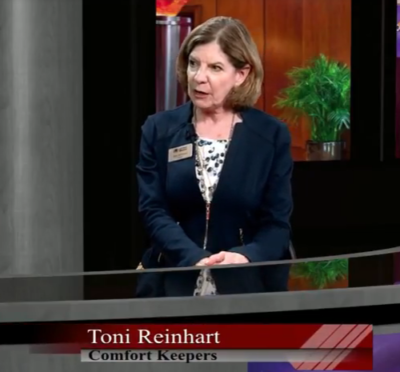Dementia Friendly America – Herndon, VA
(June 20, 2018) Catherine Read interviews Toni Reinhart, a Certified Dementia Practitioner and owner of Comfort Keepers in Herndon, VA. After caring for her own father, who was diagnosed with Alzheimer’s disease, she noticed how difficult it was to navigate getting around in the community with him. Last March, Toni learned about Dementia Friendly America, an organization committed to helping communities support people living with dementia and their caregivers. Dementia friendly communities foster the ability of people living with dementia to remain in the community and engage and thrive in day-to-day living. Toni then went about establishing Herndon, VA as the first pilot community for the organization in Virginia.
After receiving the green light to move ahead with this initiative from Mayor Lisa Merkel, Reinhart put together an action team to get started on the work involved to establish Herndon as a dementia friendly town. This included meetings and trainings with everyone from the local police force to business owners. The trainings covered communication tips on best practices of how to interact with elders, including to make sure that they use eye contact, to wait and listen, to remain calm, to not be aggressive and to not touch anyone unexpectedly. As Reinhart points out, these habits are good ones to have when approaching all people, especially elders who may be confused. Other challenges that are faced by seniors include that people do not wait, stop and listen. This can be important if someone is searching for the proper words or vocabulary so they can effectively communicate their needs.

In the second segment of the show, Toni discusses the challenges for family members in identifying weather or not their loved one may be experiencing dementia. She notes that changes in behavior, such as confusion or disruptive behavior that is out of the norm, may be indications that their loved one might be suffering. When elderly parents are living alone, it is important to have good communication channels with friends and neighbors who can help identify some of these patterns. If they notice unusual aggressive behavior, paranoia, loss of vocabulary or recollection of details like names and places then it might be time to have them undergo an evaluation by their physician.
On a lighter note, Reinhart shared some information about recent studies that indicate certain behaviors can help reverse aging in the brain. If your elderly loved one enjoys dancing, a recent Harvard study shows that dancing can reduce the risk of dementia by up to 75%, and 90 minutes of dancing a week has shown to reverse the aging of the brain. It has long been known that the music and rhythm is retained the longest, while we tend to lose other information like names and places. Listening to music can be therapeutic to elderly people suffering from dementia. Reinhart also notes that engaging in physical activity and following a heart-healthy and brain-healthy diet is also helpful. Social engagement is another important tool to keeping the brain healthy.
When elders are isolated it has been proven that their health deteriorates. This is a particular challenge for elders who are aging in place in suburban areas like Fairfax County, especially if they no longer drive. Many communities are now establishing volunteer networks to help seniors get out and about. In Reinhart’s community of Herndon there is the Herndon Village Network, where volunteer drivers are available to take seniors out to meet up with friends, attend events in the community or just simply get out to the store.
If people are interested in learning more about Dementia Friendly America, or perhaps starting this program in their own community, Reinhart is available to speak with you and lend her advice. Information about the program can be found at www.dfaherndon.org